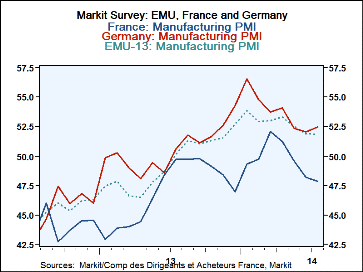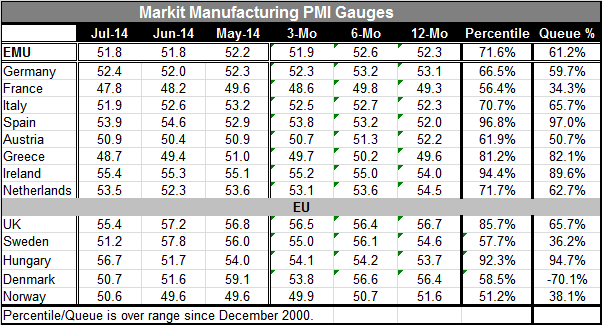 Global| Aug 01 2014
Global| Aug 01 2014Manufacturing Stays Subdued in Europe in July
Summary
The Markit EMU manufacturing PMI was flat in July at 51.8. At that level the EMU metric stands in the 61st percentile in its historic queue. Germany, the usual manufacturing leader in Europe, has its manufacturing PMI in the fifth [...]
 The Markit EMU manufacturing PMI was flat in July at 51.8. At that level the EMU metric stands in the 61st percentile in its historic queue. Germany, the usual manufacturing leader in Europe, has its manufacturing PMI in the fifth position (based on raw diffusion values) relative to the eight EMU members listed in this table,
The Markit EMU manufacturing PMI was flat in July at 51.8. At that level the EMU metric stands in the 61st percentile in its historic queue. Germany, the usual manufacturing leader in Europe, has its manufacturing PMI in the fifth position (based on raw diffusion values) relative to the eight EMU members listed in this table,
France did not improve this month. Its PMI deteriorated to 47.8 in July from 48.2 in June. At this PMI level, the French manufacturing PMI stands only in its 34th queue percentile and is the weakest country in the table of EMU members by a long shot.
Only Greece and France among EMU members have PMI values below 50.
This month, among the eight reporting EMU members, manufacturing improved in four of these eight countries. Improving are Germany, Austria, Ireland and the Netherlands. Deteriorating are France, Italy, Spain and Greece.
Outside of the EMU areas, the U.K. saw its manufacturing index drop sharply to 55.4 in July from 57.2 in June. With that, the percentile standing of the U.K. index fell to its 65.7 percentile level.
Also declining is Sweden whose long string of manufacturing increases stays intact but whose manufacturing index has plunged to 51.2 in July from 57.8 in June. At a level of 51.2, Sweden's manufacturing index stands in the lower 36 percentile of its historic queue, near where France stands. For Sweden, this is a very low level for manufacturing.
Denmark also saw manufacturing slip, to the 50.7 mark in July, still showing expansion, from the level of 51.6 in June.
Improving on the month among the non-EMU nations were Norway and Hungary. The Hungarian index improved from 51.7 in June to 56.7 in July, marking a strong gain. At that level, Hungary's index has only been higher about 5% of the time. Norway saw its manufacturing sector move from contraction at a PMI value of 49.6 in June to expansion at a PMI value of 50.6 in July.
On balance, Europe shows a lot of cross currents in July. The EMU area's PMI is unchanged but there are a lot of changes among members. Germany is no longer looking as strong raising the question about overall demand for manufactured goods. Geopolitical events may be taking their toll on European growth. The loss of economic momentum at the same time that inflation pressures have abated to run at just 0.4% year-over-years leaves Europe in a vulnerable position.

Robert Brusca
AuthorMore in Author Profile »Robert A. Brusca is Chief Economist of Fact and Opinion Economics, a consulting firm he founded in Manhattan. He has been an economist on Wall Street for over 25 years. He has visited central banking and large institutional clients in over 30 countries in his career as an economist. Mr. Brusca was a Divisional Research Chief at the Federal Reserve Bank of NY (Chief of the International Financial markets Division), a Fed Watcher at Irving Trust and Chief Economist at Nikko Securities International. He is widely quoted and appears in various media. Mr. Brusca holds an MA and Ph.D. in economics from Michigan State University and a BA in Economics from the University of Michigan. His research pursues his strong interests in non aligned policy economics as well as international economics. FAO Economics’ research targets investors to assist them in making better investment decisions in stocks, bonds and in a variety of international assets. The company does not manage money and has no conflicts in giving economic advice.






